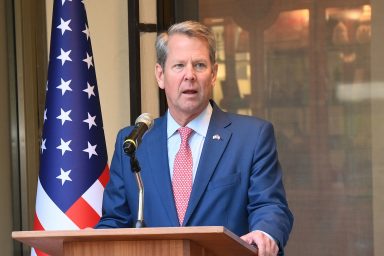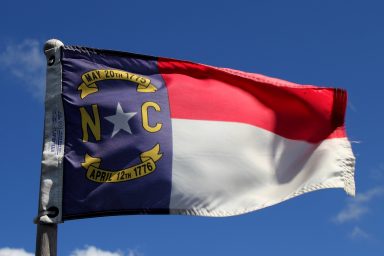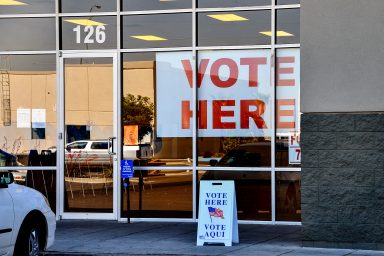Donald Trump talks a lot about winning but he runs a campaign that almost seems intended to fail — and wreak havoc on the GOP in the process. Could he be helping an unpopular Hillary Clinton more if he tried?
Last July, the conservative Washington Post columnist George Will asked the question,
“If Donald Trump were a Democratic mole placed in the Republican Party to disrupt things, how would his behavior be any different?”
At the time, he was talking about the effect Trump would have on the upcoming first Republican debate. The eventual Republican nominee, in Will’s words, might say “something hideously inflammatory.”
“The debate gets hijacked,” Will said in his comments about Trump in July. “The process gets hijacked.”
Here’s an example of Will’s mole theory at work: Earlier this month, Republican Speaker of the House Paul Ryan, who had just endorsed Trump, held a press conference in an impoverished part of Washington, D.C., trying to gain attention for a GOP plan to fight urban poverty. But the media did not cover his plan to help the city’s poor.
It focused instead on a question asked by a reporter about Donald Trump’s verbal attacks on the ethnicity of Gonzalo Curiel, the federal judge presiding over a fraud case against Trump University. The headlines, rather than naming any of Ryan’s policy proposals, were all about his response:
“Claiming a person can’t do the job because of their race is sort of like the textbook definition of a racist comment. I think that should be absolutely disavowed. It’s absolutely unacceptable.”

An Unforced Error
.
With high profile Republicans, including Senate Majority Leader Mitch McConnell, and frequent Trump apologist Newt Gingrich, denouncing Trump’s comments as racist, it becomes worth asking George Will’s question again.
Is Donald Trump, who spent most of the past few decades as a Democrat and personal friend to the Clinton family, trying to drive the Republican party into a ditch?
Simple logic would suggest he is not — a Trump presidential campaign that goes down in flames would put him in a place of deep dislike among much of the American people, and the effect on his brand, businesses, and celebrity would be bad enough for him personally that he probably would never attempt such an elaborate scheme, even to help his closest friends.
But as George Will pointed out, it matters little what Trump’s original intention was. His campaign is turning into exactly the kind that someone would run if they wanted to deliberately hand the election to the Democrats.
Trump has already gone out of his way to offend several important groups — women, a war hero, the mighty media, Mexicans, and again, Mexicans..
Trump’s racist comments about Judge Curiel weren’t a mere gaffe. He was not caught off guard by a question about it. Instead, Trump deliberately brought up the judge’s heritage seemingly out of nowhere at a rally, and has only doubled down when asked about it.
An article published by Bloomberg highlighted just how much Trump’s vendetta against the judge flies in the face of good campaign strategy. On a conference call with campaign surrogates — including high-ranking Republican elected officials who planned to speak for Trump in media appearances — Trump began to yell about a memo that his PR team had sent out trying to tamp down discussion of Trump’s comments.
He lashed out, saying that the campaign needed to defend itself against journalists. “The people asking the questions — those are the racists,” Trump was quoted by Bloomberg. “I would go at ’em.”
Trump’s combative strategy not only hurts any attempts at party unity; it also highlights the acrimony that seems to be brewing within the Trump campaign apparatus.
As quoted in the Bloomberg article, Trump even attacks one of his own staffers when he tells his campaign surrogates: “You guys are getting sometimes stupid information from people that aren’t so smart.”

Photo credit: Gage Skidmore / Flickr (CC BY-SA 2.0)
Deliberate Fumbling?
.
The very existence of this article is a sign that Trump’s campaign is eating itself from the inside. The information in the Bloomberg article came from two Trump supporters, who spoke on condition of anonymity.
Leaks are usually a sign of trouble in an election campaign. In 2008, for example, numerous staffers working with vice presidential candidate Sarah Palin spoke candidly to the press about their frustrations with the Alaska governor. It has become a time-honored tradition for those on a sinking ship to bad-mouth the captain in the hopes of salvaging their reputations for future work.
But we’re still five months away from the general election. If these leaks are coming out of the Trump campaign now, then what can we expect over the next few months?
Numerous media outlets covering the Trump campaign have reported that it is understaffed, overtaxed, and chaotic, without strong day-to-day leadership. The operation is said to be plagued with constant discord between loyalists to Trump’s original primary team — led by campaign manager Corey Lewandowski and press secretary Hope Hicks — and the new hires brought on board by strategist Paul Manafort.
Rick Wiley, who was hired by Manafort to be the campaign’s national political director, was fired just six weeks into his new job, purportedly over clashes with state directors loyal to Lewandowski.
And The New York Times reported that people in the campaign “have told associates they believe that their Trump Tower offices in New York may be bugged.”
All this chaos comes from a campaign staff of only 73, compared to the Clinton campaign’s more than 800. Trump has been reluctant to spend money on his campaign, not wanting to dip further into his personal fortune, and not showing any affinity for traditional fundraising. He has worried many Republican strategists with his outright refusal to invest in a data analytics team, which is usually helpful in get-out-the-vote efforts and ensuring that the right message reaches the right voters.
A more robust data operation might have dissuaded Trump from spending his campaign’s meager funds contesting New York, a state that went to President Obama by a nearly 30-point margin, and which had been represented by Hillary Clinton as its senator during its darkest hour, in 2001.
Trump claims that his spartan campaign is more versatile and less wasteful than a full-scale national operation, and that he was able to win the primary against well-seasoned opponents based solely on the strength of his singular personality.
But the task of earning the more than 60 million votes needed for the general election poses very different challenges from winning 13 million votes to secure the Republican nomination.

Missed Opportunities
.
Trump’s lean-and-mean staff was well suited to a primary where he was up against 16 competitors, and was able to stand out from the crowd because of his celebrity status. His Twitter account, with more than 8 million followers, was better positioned to drive the conversation than a slew of barely-charismatic senators and governors jockeying with each other for attention while initially ignoring the buffoonish reality-TV star.
But in the general election, Trump is up against one of the most famous women in the world. The media will likely cover both of them on a near constant basis, undercutting Trump’s ability to generate media-space with salvos of crude insults.
A general election media strategy usually depends on keeping good news about your candidate and bad news about your opponent in the headlines. A well-run campaign fights back against negative news by ensuring that something positive replaces it in the news cycle.
The Trump campaign has so far proved inept in fighting back against Clinton in news coverage.
On May 25, the State Department’s Office of the Inspector General filed a report deeply critical of Hillary Clinton’s use of a private email server while she was Secretary of State. The smart response from the Trump campaign all week would have been…nothing — allowing the media to stay focused on a story that hurt Clinton.
But instead, the political press became focused on Trump’s dismissal of Wiley, before focusing on his over-inflated claims of donations made to veterans’ groups.
On June 2, a Clinton speech attacking Trump’s temperament and ability to handle important foreign policy and national security matters received coverage from numerous major media outlets. Once again, the Trump team did not come up with a helpful response to take media attention away from Clinton. The only Trump news in this period was the aforementioned attacks on Judge Curiel’s Mexican lineage.
Dismal Approval Among Minorities
.
The hubbub over Judge Curiel highlights perhaps the most important way in which Trump has refused to adjust to the difference between the primary and general elections. Exit polls of the Republican primary showed more than 80% of voters were white. In the coming general election, demographic projections suggest that 31% of eligible voters will not be white.
And blacks and hispanics have shown deeply unfavorable views towards Trump in polls.
Trump’s whites-only strategy flies in the face of the Republican party’s own plan for how this election would pan out. In the wake of Mitt Romney’s loss to Barack Obama in 2012, the Republican National Committee commissioned a report, called the Growth and Opportunity Project (also informally referred to as the “autopsy” report), figure out how the party could turn things around in 2016.
A major recommendation of the report called for broadening the GOP’s base beyond white voters, with an especially enthusiastic outreach towards Hispanics.
“If Hispanic Americans hear that the GOP doesn’t want them in the United States, they won’t pay attention to our next sentence,” wrote the report. “It doesn’t matter what we say about education, jobs or the economy; if Hispanics think that we do not want them here, they will close their ears to our policies.”
Trump’s campaign has seemingly taken the opposite approach, calling Mexican immigrants “rapists,” repeating ad infinitum his vague plan to build a wall on the border, claiming a sitting federal judge cannot judge him fairly because he is of Mexican heritage.
And counting a taco bowl he ate on Cinco De Mayo as “outreach”.
This was exactly the kind of thing George Will was talking about. Republican leaders wanted a candidate who could expand the party and stop Hispanics from becoming lockstep Democratic voters. Among the many candidates who ran for the Republican nomination were Marco Rubio and Jeb Bush, who had both successfully made inroads with Hispanic voters in their native state of Florida.
That Puzzling Phone Call
.
In December, Jeb Bush tweeted, “Maybe Donald negotiated a deal with his buddy @HillaryClinton. Continuing this path will put her in the White House.”
Bush had a point. Clinton and Trump had known each other for decades before the mogul decided to run for president. Both Bill and Hillary Clinton attended Trump’s third wedding at his Florida estate in 2005. Ivanka Trump and Chelsea Clinton, the daughters of the two candidates, have shared a longstanding friendship. In a 2012 interview with Fox News’ Greta Van Susteren, he called Clinton “a terrific woman” and praised her tenure as Secretary of State.
“I think she really works hard and I think she does a good job,” he told Van Susteren in 2012. “I like her.”
The Washington Post reported last summer that shortly before entering the race, Trump talked with Bill Clinton on the phone and discussed his role in politics.
It is hard to resist wondering what the two talked about in that phone call. For Trump to actually be running with the direct intention of getting his old friend into office would be among the most outlandish and crazy things ever to have happened in the history of American politics.
But so many things about the 2016 campaign have defied conventional wisdom and expectations. And as a possible conspiracy theory, it benefits from having a shockingly small amount of people who would need to keep quiet.
If Trump planned on wrecking the Republican party to make Hillary Clinton president, the only three people who would have had to be in on it were the Clintons and Trump himself.
Speculating about the secret inner thoughts of Donald Trump is a game you cannot win. But Will’s question remains difficult to answer. “If Donald Trump were a Democratic mole placed in the Republican Party to disrupt things, how would his behavior be any different?”
Hillary Helper
.
We are in the midst of Hillary Clinton’s second attempt and Clinton’s limitations as a presidential candidate have become clear.
In her own words, she is “not a natural politician.” She is an awkward campaigner, has trouble relating to voters, is widely seen as untrustworthy, and is attacked from both the right and the left. She has been dogged by a scandal that brings into question her ability to be trusted with information sensitive to national security. In poll after poll, she has record-breaking unfavorability ratings.
But the dislike Americans feel toward Clinton is dwarfed only by their ill-feelings towards her opponent. After a brief bump in polling when he locked down the Republican nomination, Trump has been falling in head-to-head matchups with Clinton. She has become the overwhelming odds-on-favorite among bookmakers.
Some might see George Will’s slyly provocative question as the ultimate in conspiracy theorizing. What does Trump have to gain from giving Hillary a leg up to the White House? A Get-Out-of-Jail card after the Trump University verdict comes down?
In the end, who can say what goes on beneath that famous excrescence of hair?
But one thing is for sure: If Hillary Clinton becomes president, a big part of the reason will be her old friend Donald Trump.
Related front page panorama photo credit: Adapted by WhoWhatWhy from Donald Trump Gage Skidmore / Flickr (CC BY-SA 2.0) and Bill Clinton (White House / Wikimedia)



